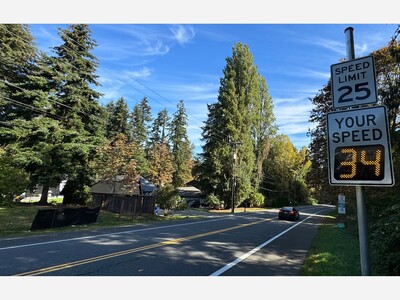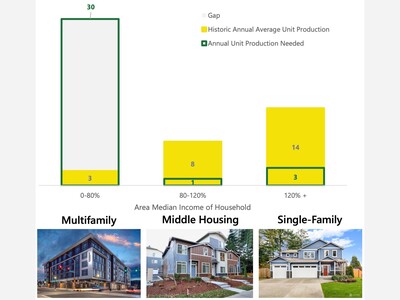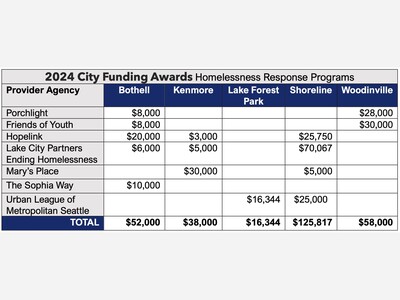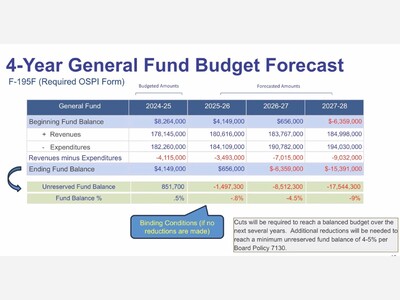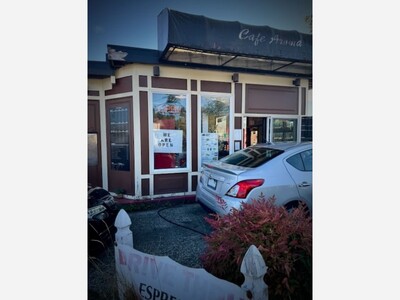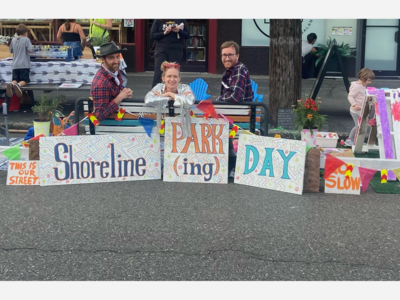Parking and hardscape mandates discussed by Shoreline council
The Shoreline council reviewed an update to the draft 2024 Comprehensive Plan at the Monday September 30 meeting. This year’s update to the comprehensive plan includes compliance with the state’s Middle Housing law, which requires cities to allow higher density housing in residential neighborhoods previously zoned for single-family homes only.
Written by city staff and the Planning Commission, the draft comp plan would have allowed more hardscape (buildings and other hard surfaces like parking spaces) based on the number of dwelling units on a lot - allowing middle housing developers to cover over 60% of a lot with hardscape while single-family developers would be kept below a 50% limit.
Mayor Chris Roberts spoke against the plan to increase hardscape maximums based on the number of units. “We know we are in a housing crisis… and we know as a city… we want to increase our tree canopy. And so when I look at this code… it’s not possible… We can’t increase our tree canopy and also take our hardscape from a maximum of 50% right now… and say you can build to 60% or higher than 60%,” he said. “If we are trying to preserve trees… We have to keep that hardscape limit down…. We have to encourage developers to build around trees,” he added, “So I’m not concerned about the number of units… To me, a six bedroom house is the same as a six unit sixplex.”
Under the new state law cities may not require on-site parking for middle housing developments located within a half-mile of a major transit stop. An earlier draft of Shoreline’s comp plan reviewed in July, ended minimum parking mandates in neighborhoods within walking distance of transit while still requiring property owners further from transit to pave parking spaces whether they want them or not. A map from that earlier draft showed most of the city within walking distance of transit.
“I have come around over the years, to being okay with parking limits being completely eliminated,” said council member Keith Scully at this week’s review. “We can’t have all three. We can’t have both density and hardscape limits and mandatory parking. And of the three, I would reduce parking. So I am okay with all the proposed parking limitation reductions. And I would be okay with going much further and making parking not mandatory on any new structures in these zones.”
If Shoreline removes all parking mandates, the city would join the cities of Spokane and Port Townsend who both removed minimum parking mandates in September.
Not everyone on the council is ready to end parking mandates in Shoreline.
At the July review of the earlier draft of the plan, council member Annette Ademasu said at the time, “I’m very concerned about opening the majority of the city to middle housing” and pushed back against the proposal to reduce parking mandates. “I am pretty upset with house bill 1110 that there are no parking requirements for half a mile of transit so I would urge the city to please, when ADUs are built, if there is no on street parking available, to require a parking space,” she said.
Many communities in Washington already have more parking spaces than residents - leading to more driving and greenhouse gas emissions according to the Municipal Research and Services Center. Planning experts say minimum parking mandates increase the cost of building residential real estate which contributes to less affordable housing. Parking spaces also make neighborhoods hotter through the heat island effect and can send dirty stormwater runoff into streams, lakes, and Puget Sound.
More News from Shoreline
- Shoreline and Lake Forest Park take different pedestrian safety routes Shoreline and Lake Forest Park take different pedestrian safety routes
- Local budgets say what cities will do (and not do) about homelessness How much will Shoreline, Lake Forest Park, Kenmore and Bothell spend to address rising homelessness in the region? Comparing budgets reveals priorities.



